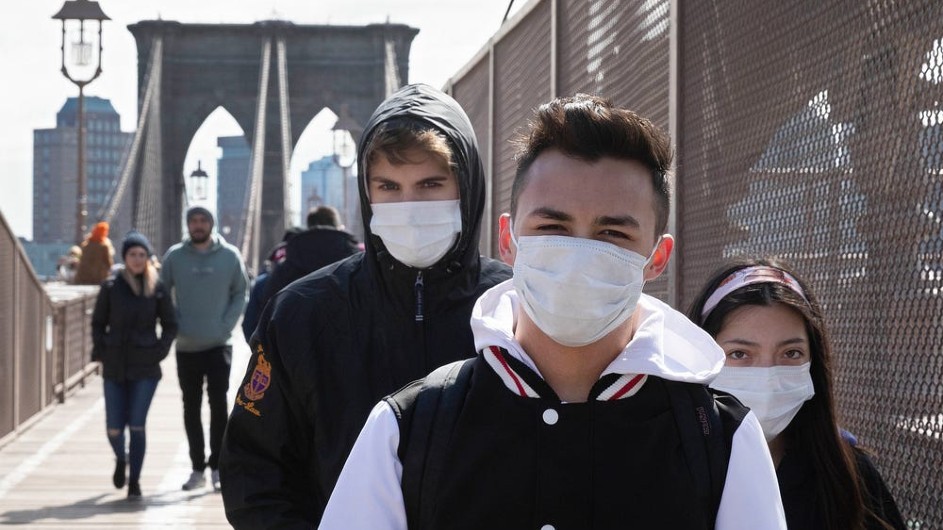Many Global Youth Reject the Status Quo
Defying normal, young people from 10 countries demand to be part of the rebuilding process for a post-COVID world.

In the wake of the COVID-19 pandemic, there are increasing concerns among young people about the future as higher education institutions worldwide grapple with deep budget cuts, low student-enrollment and the challenges of distance learning. Yet many of those young people are looking beyond higher education for a better tomorrow, and they are demanding changes now.
More than 90 people, ages 18 to 26, from around the world—the United States, Brazil, India, Jordan, Kenya, Lebanon, Singapore, Tunisia, Turkey and United Arab Emirates—joined a series of virtual conversations hosted by Columbia’s Committee on Global Thought in the final months of the spring semester. During the discussion, the youth shared their uncertainties around their academic futures and engaged one another about how they might change their communities and world for the better. A recurring theme emerged: None of the youth wanted the world to return to pre-coronavirus normal. Seeing COVID-19 as an opportunity to address the socioeconomic, political and environmental issues that underpin the pandemic, they are finding ways to reimagine and enact a new world.
Global Think-In: Youth Voices on the COVID-19 Pandemic
The Future Is Always Uncertain
For those in the global north, what they thought was normal has laid bare society’s fissures and disparities, be it economic, social or racial. The Band-Aid is now ripped off, and gaping wounds are in plain sight. Their southern counterparts have known about such disparities and the uncertainties that accompany them. They respond to uncertainties differently, but they have one impact of the pandemic in common: they worry about their educational and professional futures. For many in the north, this uncertainty feels like uncharted territory. “We are used to certainty,” said U.S. college student Silas Swanson. “So, how can we normalize uncertainty?”
Their counterparts in the global south, many of whom are familiar with economic uncertainty, are facing a different kind of unpredictability. “For Turkish young people, the future is always uncertain. This epidemic just added another layer of uncertainty. We are always afraid of graduating and that the economy will worsen in the future,” explained Cansu Ceylan, a Turkish student. Emerson Caetano, an Afro-Brazilian activist in Rio, pointed out, “Lockdown is a privilege. Poor people can’t stay at home.” Even for those who have a home where they can self-isolate, new pressures have risen. Gacia Boyadjian, an undergraduate in Lebanon, explained, “My brother and I have been going to work at our shop. We are risking our health to support our family. I didn’t expect to be bearing this responsibility at this young age.” The students in the south seemed to feel that they were more resilient and better able to deal with uncertainties, something they could teach their counterparts in the more “advanced” countries.
Youth participants expressed disappointment with the inability of multilateral global institutions to respond meaningfully to the pandemic. A number of them said they couldn’t understand how it was possible to botch the handling of this crisis with all the scientific advances and existing global institutions. They are acutely aware of the failure of the historically powerful countries in this crisis, and some are wondering about the viability of the old global order. In this global pandemic, “There are no great powers and no third world countries now,” said Talar Keshishian, a young architect from Lebanon.
The Future has Possibilities
Though confronting uncertain futures, most of the young participants see the pandemic as an opportunity to create a more equitable normal. “Things I’d planned to do—travel, education, everything—all stopped, but coronavirus hasn’t stopped me from marching into the future,” said Anne Osamba, a youth activist from Kenya. From South India, Smriti Venkatraman described visible environmental changes as a result of the government-mandated shutdown. “We have been able to see the sky clearly for the first time,” she said. “My only fear would be us crawling back to the old ways.”
For this younger generation, the pandemic has made both the problem and the solutions more palpable. “We must make history now and make things different,” said Emerson. “I don’t want to go back to normal. I want to make positive changes that are here to stay. We have to make a difference,” he added. Manvi Teki, a freshman from India, agreed. “We need to stop fighting amongst ourselves and look at the bigger issues in the world, like the impact of climate change, so that we are better prepared for matters that affect us all as a human community.”
Contrary to popular perceptions on youth in the COVID-19 era, young people—global and digital natives—are deeply concerned about the world. They are eager to engage in shaping the future. In the U.S. and abroad, young people are leading widespread protests against racism and police brutality. The disproportionate effects of the pandemic on marginalized communities throughout the U.S. are added context for young peoples’ outcry against institutionalized and government sanctioned racism. In Osamba’s words, “The pandemic is a moment of reckoning for the government to realize that young people do matter in socioeconomic and political processes.” Global youth won’t go back to the old normal. As we begin imagining a post-COVID world, we must recognize that young people have a stake in rebuilding a better world.
Vishakha Desai, Ph.D., Laura Neitzel, Ph.D. and Darlene Dubuisson are co-leaders of the Youth in a Changing World research project at Columbia University’s Committee on Global Thought. Desai is also senior adviser for global affairs to the president of Columbia University. This column is editorially independent of Columbia News.